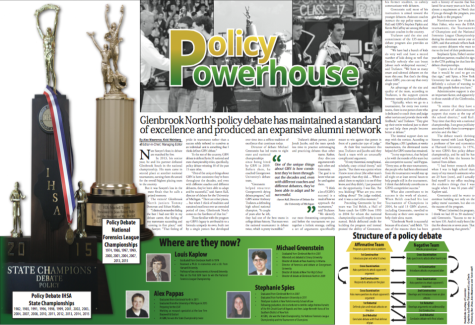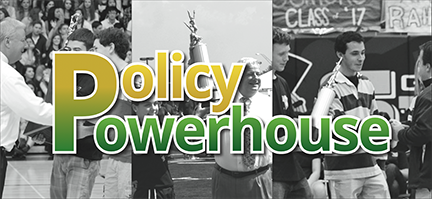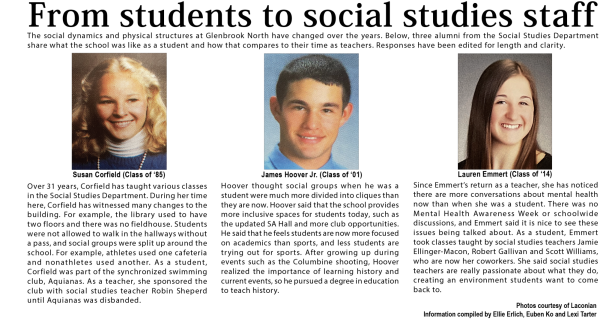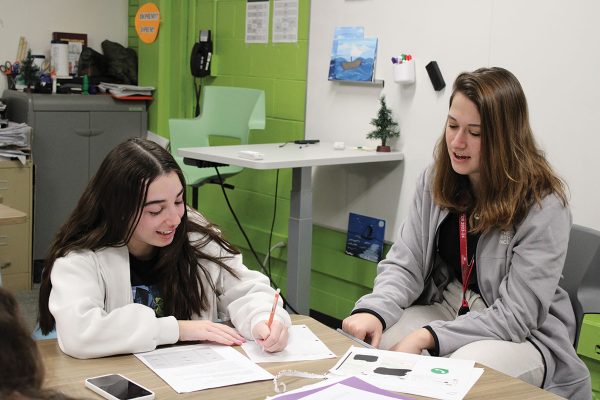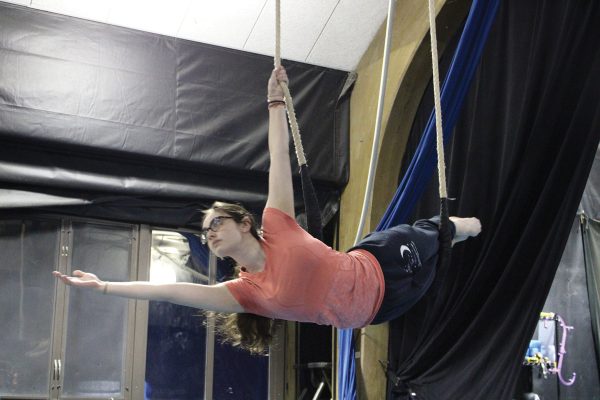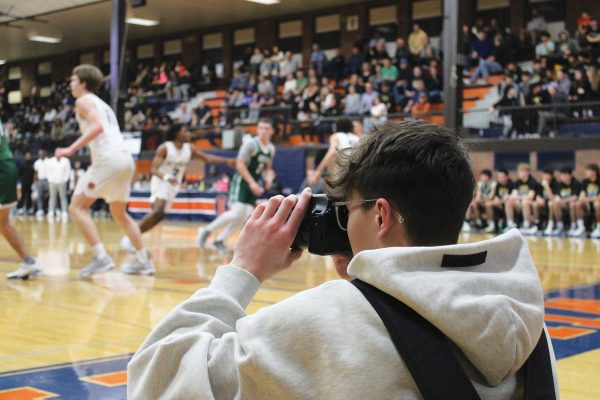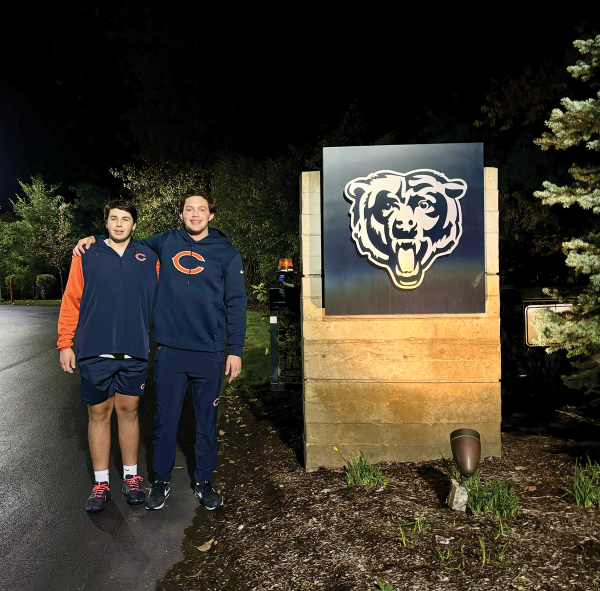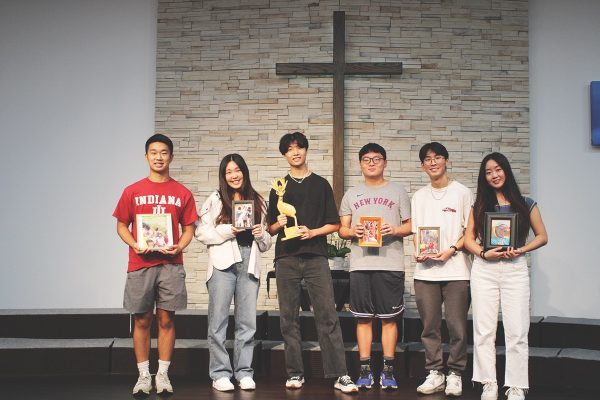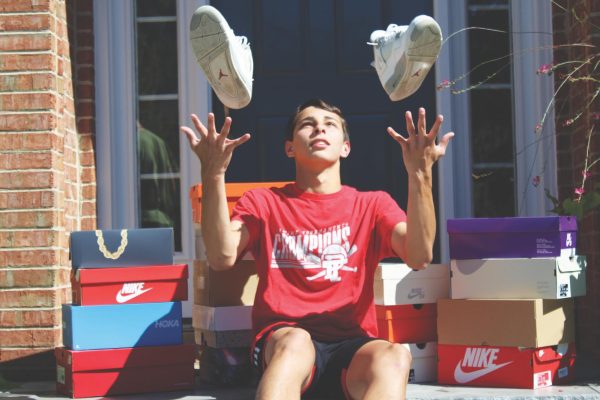Policy powerhouse
Nate Sawyer’s feats in debate are matched by few.
In 2013, his senior year, he and his partner defeated Glenbrook South in the national championship. His team came in second place at another national tournament, earning them the award for the overall highest placing team in the country.
But it was Sawyer’s loss in the state finals that he calls a prized memory.
The victors? Glenbrook North juniors Tommy Donovan and Ethan Matlin.
“I distinctly remember feeling the best I had ever felt in my debate career, that feeling of my teammates succeeding and coming in first place,” said Sawyer. “That feeling of pride in teammates rather than a success solely tethered to ourselves as an individual unit is something that I think defines GBN debate.”
To the rest of the country, GBN debate is defined by its 31 national and state championship titles, specifically, policy debate winning 10 of the past 15 state titles.
“One of the unique things about GBN is how consistent they’ve been throughout the decades, and even with different coaches and different debaters, they’ve been able to adapt and be successful,” said Aaron Kall, director of debate for the University of Michigan. “There are other places, … but when I think of tradition and sustained excellence over an extended period of time, Glenbrook North comes to the forefront of that list.”
Those familiar with the program say GBN’s legacy is attributable to a formula uniquely its own, built not by a single person but developed over time into a selfless tradition of excellence that continues today.
Director of debate Michael Greenstein has led teams to eight state and national championships since being hired by GBN in 2009. Before then, he coached Georgetown University’s debate team.
“Greenstein helped resurrect Georgetown’s dying debate program,” said GBN senior Anthony Trufanov, a defending high school national champion. “A couple of years after he left, they had one of the best teams in college debate history. That team won the national tournament in debate twice, which is pretty incredible.”
Trufanov’s debate partner, junior Jonah Jacobs, said the team spends less time in practice scrimmaging and practicing debates than other teams. Rather, they discuss arguments with each other and Greenstein. The goal is to know what can be used against them.
“I think a lot of [GBN’s success] is a result of how we approach the tournament,” said Trufanov. “We identify our most threatening competitors, and before the tournament we put together a holistic strategy, crafting a set of arguments specifically meant to win against that person in front of a particular type of judge.”
At their first tournament this year, Trufanov and Jacobs said they faced a team with an unusually complicated argument.
“It’s very theoretical, metaphysical, scholarly, crazy critical theory,” said Jacobs. “But there was a point where I knew more about [the other team’s argument] than they did. … When I asked them to explain it to see if they knew, and they didn’t, I just pounced on the opportunity. I was like, ‘Are you kidding? What are you even talking about?’ The judge nodded, and it was a cool ethos moment.”
Preceding Greenstein by five years was Ted Belch, a Hall of Fame coach for GBN from 1993 to 2004 for whom the national championship coach’s trophy is now named. Belch deflected credit for building the program and instead praised the ability of Greenstein, his former student, to calmly communicate with debaters.
Greenstein said most of his instruction is aimed toward the younger debaters. Assistant coaches instruct the top policy teams, and Kall said GBN’s Stephen Pipkin and Kevin McCaffrey are among the best assistant coaches in the country.
Trufanov said the size and commitment of the 135-member debate program also provides an advantage.
“We have had a bunch of kids do very well and have a record number of kids doing so well that literally nobody else can boast [about such widespread success],” said Trufanov. “We have so many smart and talented debaters on the team this year. But that’s the thing about GBN, you can say that every single year.”
An advantage of the size and quality of the team, according to Trufanov, is the support system between varsity and novice debaters.
“Typically, when we go to a tournament, for every two novice teams, there is one person there who is dedicated to coach them and judge other novices and provide them with feedback,” said Trufanov. “They give up their entire weekend just to show up and help these people become better at debate.”
The internal support does not stop with the novices. According to Alex Pappas, a 2011 graduate, at varsity tournaments, the eliminated teams helped the GBN teams that remained.
“In my experience, that helped a lot with the morale of the team but also competitive success,” said Pappas. “Every year, at the state tournament, the people who had been eliminated from the tournament would stay up all night or at least several hours to help people still in the tournament. I think that definitely contributes to GBN’s competitive success.”
What also contributes to its success is the work of alumni. When Belch coached his last Tournament of Champions in 2004, he said 13 GBN alumni, including Greenstein, travelled to Kentucky at their own expense to help their alma mater.
“Glenbrook North is successful because of its alums,” said Belch. “It’s one of the reasons there has been such a history of success that has lasted for as many years as it has. It’s almost a requirement at North that if you go through the program, you give back to the program.”
Northwestern law student Matt Fisher, who won the IHSA tournament, the Tournament of Champions and the National Forensics League Championship during his dominant senior year at GBN, said that attitude reflects back onto current debaters who want to rise to the level of their predecessors.
Stephanie Spies, Fisher’s senior year debate partner, recalled the sign in the CPA parking lot that lists the debate championships.
“I spent a lot of time thinking that it would be cool to get on that sign,” said Spies, a New York University law student. “There is definitely a culture of wanting to excel like people before you have.”
Administrative support is also an important factor, and apparently to those outside of the Glenbrooks, it shows.
“It seems that they have a great amount of administrative support that starts at the top of the school district,” said Kall. “Any time that they win a national championship, I see great publicity associated with those in newspaper articles and the like.”
The debate team’s thriving history started with Louis Kaplow, a professor of law and economics at Harvard University. In 1974, he won GBN’s first policy debate championship, and he said he has carried with him the lessons he learned from debate.
“I had better research skills when I was in high school than many of my research assistants who are 23 have [now], and I actually find myself in my office teaching the students things that I was taught when I was 16 years old,” Kaplow said.
Greenstein said he wants to continue building not only on the policy teams’ successes, but also on the success of the program.
“When I inherited the program, I think we had 20 to 30 students,” said Greenstein. “Success to me is we have 135. And it’s really been like that for about six or seven years. That growth. Sustaining that growth.”
